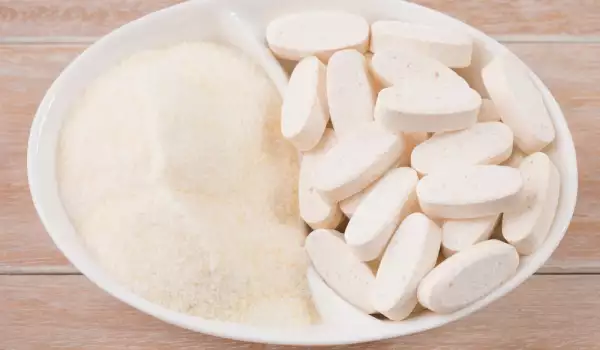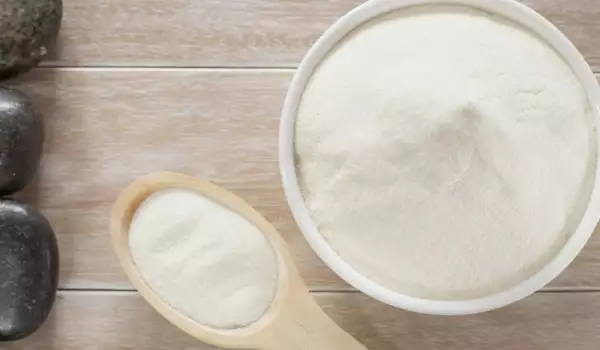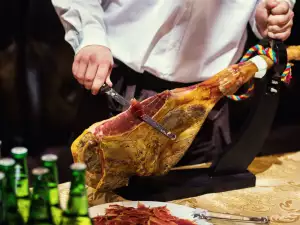In your favorite face cream, body lotion, nutritional supplements and even medicine, we often find the presence of collagen. What is collagen, what role does it play in our body, to be present as a component of the products we use every day?
The answer lies in getting to know the essence and role of this natural product of the body of humans and animals, which has a leading importance for the body's structure.
Nature and importance of collagen
The main structural protein of the connective tissue of the human body, as well as that of almost all mammals, is called collagen. The name itself comes from the Greek word kolla, which means glue. This name is extremely well found for the building block that supports tissues, bones, tendons, muscles and strengthens them.
It is a hard, insoluble, fibrous protein that the human and animal body produces. It is built in a unique way. Each chain in its triple helix contains about a thousand amino acids. The collagen molecules are linked to form long and thin fibers, which are mainly characterized by their strengthening effect.
All of these are important to the proper function of the body because they provide all the bone strength, muscles and tendons it needs. Being the most abundant protein in our body, collagen literally binds its components together. The strength, structure and flexibility of the skin, tendons and muscles are due to collagen. Last but not least, the fresh and radiant appearance of the face and the entire skin. It also takes care of nails, teeth and hair.
The most abundant protein in the human body also serves to strengthen blood vessels and plays a role in tissue development. It is a major component of bones and teeth. Collagen as a component represents 25 percent of all proteins. It can speed up the metabolism and help gain muscle mass.
The gastrointestinal tract also needs this indispensable ingredient. Deficiency causes a breakdown in a person's immune system. This means that additional intake of collagen should be resorted to when boosting immunity is needed.
It is clear that it is a vital component of our body where health and beauty go hand in hand and we need to have it available throughout our lives.
Status of collagen in the body at different ages

Unfortunately, the human body does not constantly produce collagen in the required amount. As we age, the production of this important protein decreases more and more. This fact is visibly reflected in the appearance. The skin sags, wrinkles appear, hair loses its shine and its healthy appearance, nails break easily and the body becomes increasingly difficult to move.
Separately, there are other factors that negatively affect the important component of our body and depend on a person's lifestyle and behavior. These are smoking, consumption of products containing sugar, exposure to sunlight during the dangerous periods of solar activity.
How do we know that collagen production in our body is starting to decrease?
Since this process begins at an early age, around 25 years, it cannot easily be seen. Over time, it starts to show more and more. Still, there are ways to sense the symptoms and seek countermeasures.
When the bone of the joint and the cartilage itself changes its structure from smooth elastic to hardened and even uneven, it means that the collagen level has decreased. This fact is felt in difficult movements and some disorders in joint functions. Due to the disorders in the cartilage, joint pain also occurs.
This problem can be corrected with the help of supplemented collagen, but there are several types, so information about each type and its application will help in choosing the type you need.
Types of collagen and their application
An extremely large number of types of collagen are known, and almost 90 percent of that in the human body is found in types I, II and III. These three types are crucial for the integrity of the fabric, for its mechanical properties and the resistance it exhibits.
After the age of 25, collagen production decreases by 1.5 percent per year. After the age of 40, the process speeds up and the percentage is 25 and at the age of 60, collagen production has decreased to half.
Here is which collagen will help us with the problems that appear.
Collagen type I
This collagen can be found in places like skin, tendons, blood vessels and internal organs. About 60 percent of all collagen in our body is of this type. It is mainly characterized by its resistance to heavy loads.
It is composed of about 10 amino acids responsible for the health of hair, skin and nails. Glycine, proline, alanine and hydroxyproline are the best known among them.
Collagen type II

This collagen is also rich in amino acids and builds articular cartilage. It also improves their functions. It accounts for almost 90 percent of the content of joint cartilage and its main role is to take care of the cartilage tissue.
It is important to note that collagen type II has a different amino acid composition compared to type I and type III and therefore should not be taken together with the above two types. It is possible that the body does not recognize the protein as collagen.
Key to type II are chondroitin and hyaluronic acid, which have been shown to be very beneficial for joint health. These elements together counteract osteoarthritis, and chondroitin specifically reduces inflammation and wear and tear of cartilage tissue.
Collagen type III
Collagen type III is a major component of reticular fibers and very often goes together with type I. With its help, new connective tissue is built in wounds, for example. It is also present in places such as the skin, arterial walls, and a deficiency causes rupture of blood vessels.
Collagen type IV
This collagen is contained in the tissue that surrounds some of the organs, muscles and fat tissue. It has an important role in maintaining the cells and tissues of some organs such as the kidneys, eyes and inner ear. Mutations in the gene cause damage to the inner ear. The collagen itself can also be damaged and then Alport syndrome develops.
Collagen type V
In order for type I and type III to fibrillate, as well as to build tissues, type V collagen is essential. It also has a role in building the bone system, liver, lungs and placenta.
Foods rich in collagen

Since collagen is important, it is necessary to obtain it regularly. This is best done through food. The foods that have the most collagen are bone broth, broccoli and all types of fish. To these we should add eggs, legumes, buckwheat, oats and chicken.
Important information is that fruit and vegetables that are rich in vitamin C help build new collagen. Kiwi, lemon and pineapple are the first among them.
Some interesting facts about collagen
Type I collagen is remarkable for being highly stretchable and at the same time stronger than steel. It manages tissue regeneration and is indispensable for burn wounds.
Collagen is about 30 percent of the proteins in the body and they, in turn, make up 20 percent of the body weight.
In the cornea and pupil of the eye, collagen is in crystalline form.
Collagen has high tensile strength and is indispensable in joint ligaments.




















Comments